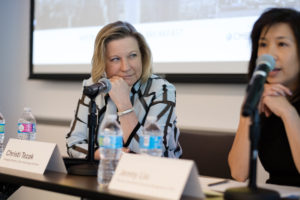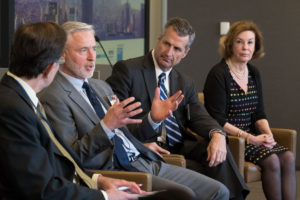“The top three things I’d like to see in my area of work are: transmission, transmission, and transmission.”
– Brad Jones, CEO, NYISO
Transmission was one of the most talked-about topics at NYEW’s two events yesterday, the Oil & Gas Breakfast in the morning and the EnerKnol-RTO Insider Panel on ISO Markets in the evening.
The Oil & Gas Breakfast brought together Kathryn O’Connor Gardner, Senior Vice President, High Yield Credit Research – Energy, AllianceBernstein; Jenny Liu, Director Generation Resource Management, NYPA; and Christi Tezak, Managing Director, Clear View Energy Partners, with Samira Salman, CEO & Founder of Salman Solutions as the moderator.
The panel talked about the rise of impact investing and how mindful investors were becoming choosier with regards to their investments. “We have to explain how fracking for natural gas works,” Kathryn O’Connor Gardner gave an example.
Turning to gas markets, the panelists emphasized the need for infrastructure – more specifically, the need to overcome opposition to building more infrastructure at the state level. This could become a serious constraint as an increasing share of natural gas consumption goes towards generating electricity. Infrastructure would also help integrate wind resources and meet New York’s challenge to have 50% renewables by 2030.
From an investing perspective, Christi Tezak highlighted that energy sectors had been moving in lockstep recently: “It is counterintuitive for some people why oil and solar are challenged at the same time … but if oil stocks fall investors are selling solar stocks too as they perceive them as high risk and want to move out of that space.”

Panelists at the Oil & Gas Breakfast at NYEW 2016
The evening event, EnerKnol-RTO Insider Panel on ISO Markets, hosted by Goldman Sachs, featured Nora Mead Brownell, Member, Board of Directors, National Grid; Erin Carson, Chief Policy Strategist, EnerKnol; Brad Jones, CEO, NYISO; Gordon van Welie, President and CEO, ISO-NE; moderated by Rich Heidorn Jr., Editor/Publisher, RTO Insider.
Defining the role of the wholesale markets was one of the most actively talked-about topics among the panelists. States would sometimes seek opposing ends, willing to promote renewables but also demanding certainty within the wholesale market structures, argued Gordon van Welie. Such burdens on the markets would cause them not performing well on a basic level, agreed Nora Mead Brownell.

Panelists at the EnerKnol-RTO Insider Panel on ISO Markets at NYEW 2016
The panelists suggested that economists had long found a way to integrate the support for renewables into the market design, namely, via a carbon tax. However, due to the lack of political leadership, the “obvious solution” to valuing carbon (and thus giving a helping hand to the nuclear industry in some states) was not possible.
Finally, the panelists reached a consensus on the need for new infrastructure. “If you like renewable energy you have to love transmission,” said Gordon van Welie. Brad Jones agreed – load centers in the United States are far away from the centers of renewable power, and transmission is crucial to deliver that green energy to the load centers. Nora Mead Brownell emphasized the need for cooperation on infrastructure: “We need to really look at the entire infrastructure needed – we just cannot continue to do things state by state, silo by silo, policy by policy.”

